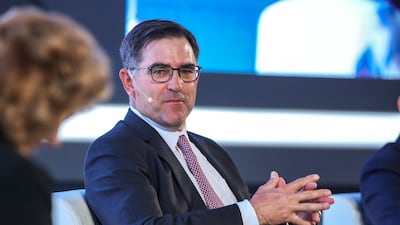The era of “exponential” growth in the US oil and gas sector "is over" as companies focus on boosting shareholder returns, according to Jeff Miller, chief executive of US oilfield services company Halliburton.
“We'll see growing investment, but quite frankly, nothing even close to what we saw from 2008 to 2014,” said Mr Miller, who was speaking at an Adipec panel on Tuesday in Abu Dhabi.
A US shale resurgence, centered around the Permian Basin of Texas and New Mexico, turned the country into the world’s largest crude producer in 2018.
Shale producers, quick to scale up drilling in response to rising crude prices, have been reluctant to increase activity as they come under pressure from investors to boost profits and returns.
“Companies were spending at a rate of 120 per cent of their cash flow and that can’t go on indefinitely,” said Mr Miller.
The US will remain the leading source of medium-term non-Opec liquids supply growth, providing 3.9 million barrels per day of oil, according to the Opec World Oil Outlook.
However, US tight oil output will peak at just 16 million bpd in 2030 due to “resource constraints”, the report said.
The current energy crisis, sparked by Russia’s invasion of Ukraine, has been exacerbated by years of underinvestment in the industry's infrastructure worldwide.
Oil and gas upstream investment needs to increase and be sustained at near pre-Covid levels of $525 billion through 2030 to ensure market balance, according to the International Energy Forum.
Upstream investment last year was depressed for a second consecutive year at $341bn — nearly 25 per cent below 2019 levels.
“We got here due to eight years of meaningful underinvestment and now what we are seeing is a supply shortage, which [will] probably get resolved with probably eight years’ worth of investment,” said Mr Miller.
____________________
Adipec 2022: day two — in pictures
____________________
Europe, which is facing an energy crisis due to dwindling Russian supplies of natural gas, is boosting imports of LNG, creating shortages in developing economies.
For the first time, the International Energy Agency said natural gas demand will plateau by 2030 as countries switch to renewable energy at a faster rate.
However, Mubadala Energy chief executive Mansoor Al Hamed said the fossil fuel will have a role to play for “decades to come”.
“Despite the price volatility, the demand for gas will continue to be strong,” said Mr Al Hamed, who was speaking at the same panel.
“In the medium term, this can be a bridge fuel to renewable [and] at the same time, a vital backup for power supply.”























